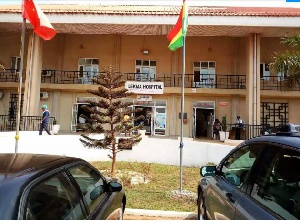 The oxygen plant will help improve health delivary at LEKMA
The oxygen plant will help improve health delivary at LEKMA
The Ledzokuku Municipal Hospital (LEKMA) will from April this year begin the production of oxygen at the facility to help save lives, Mr Charles Banafo, Administrator at the Hospital has said.
Mr Banafo noted that oxygen continued to be an essential medicine in the provision of health care delivery to the people and that it had become necessary to have an oxygen plant at the facility to assist in quality health care delivery.
“In the course of the service delivery, we experience intermittent shortages, where we have to rely on external sources for oxygen, which has not been helpful because it is expensive, and when we buy, the cost is transferred to patients,” he said.
Mr Banafo was speaking at the 2022 annual performance review meeting organised by the Ledzokuku Municipal Health Directorate at Teshie in Accra.
The annual review meeting was to take stock of the services delivered, assess achievements, shortfalls, and challenges, while exploring ways to improve on services and programme delivery to ensure better healthcare outcomes.
Mr Banafo said the delay in getting oxygen due to lack of finance affected their work and in some cases, loss of lives.
The oxygen plant is being supported by the Guangdong Province Hospital for women and children for 322,000 dollars and currently being installed to kick-start the production.
Madam Jacquiline Sfarijlani, Director of Health Services for the Ledzokuku Municipal Health Directorate, said the health status in Ledzokuku Municipality was improving as efforts were being made to better the quality of service delivery to the people.
Madam Sfarijlani said: “We work with a lot of facilities in the Municipality and they are doing well in ensuring that they provide quality health care to the people in Ledzokuku. “
The theme for the annual performance review was: “Addressing Healthcare Delivery Gap for equity in health coverage through: Intensifying health promotion interventions, optimising the use of data and technology to improve access to quality healthcare; strengthening preventive and control measures for emergent and re-emergent public health events”.
Private and public healthcare facilities gave updates on 2021 priority areas, which included expanded programmes on immunisation, infectious disease, non-communicable diseases, family
planning, adolescent services, child welfare, mental health issues, maternity health care, and mortality rates for specific diseases.
Madam Sfarijlani noted that the review and evaluation of implementation process would identify gaps and interventions, and best practices to be implemented to deliver quality and equitable healthcare to the people.
“The annual performance review shows trends in healthcare delivery in our Municipality and helps to shape policy objectives for the coming years and leads to improved performance in the quality of healthcare delivery and coverage”, she said.
She expressed satisfaction that Paediatric Tuberculosis (TB) went up within a five-year period, which she described as a good sign, adding that “it means we are doing a lot of screening, identifying and picking up a lot more of the cases and putting them on treatment for the outcome.”